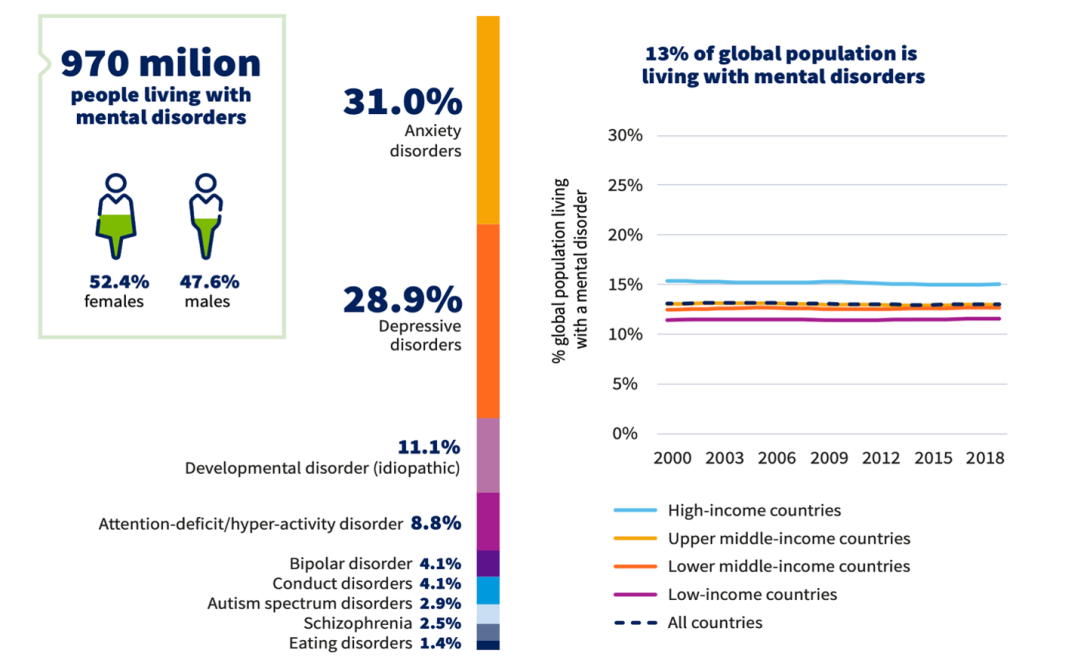This short guide explores the importance of self-care for good mental health and provides practical tips for implementing self-care strategies
Mental health is a cornerstone of overall well-being, influencing our thoughts, feelings, and behaviours. It’s not merely the absence of mental disorders but a positive state of mind that enables us to cope with life’s stresses, realise our potential, and contribute meaningfully to society. Self-care plays a vital role in maintaining mental health. By prioritising self-care, individuals can reduce stress, improve mood, and enhance their quality of life.
The global burden of mental illness
The global prevalence of mental health disorders is significant, with millions of people worldwide affected. Conditions such as depression, anxiety, and bipolar disorder can lead to substantial suffering and impairment. The COVID-19 pandemic further exacerbated these challenges, leading to increased rates of mental health issues.
Understanding mental health
Mental health is a complex interplay of biological, psychological, and social factors. It exists on a spectrum, ranging from optimal well-being to severe mental illness.
- Biological factors:
- Genetic predisposition, neurotransmitter imbalances, and hormonal changes can contribute to mental health conditions.
- Psychological factors:
- Negative thinking patterns, low self-esteem, and difficulty coping with stress can impact mental health.
- Social factors:
- Adverse childhood experiences, social isolation, and discrimination can increase the risk of mental health problems.
The importance of self-care
Self-care is particularly important in today’s fast-paced world, where stress and burnout are common. Practising self-care can reduce stress, improve mood, and enhance overall quality of life. It’s a proactive approach to mental health, empowering individuals to manage stress, build resilience, and cultivate a positive outlook.
Key self-care strategies
- Physical self-care:
- Regular exercise: Physical activity can boost mood, reduce stress, and improve sleep quality.
- Healthy diet: A balanced diet provides the essential nutrients for optimal brain function.
- Sufficient sleep: Adequate sleep is crucial for cognitive function, emotional regulation, and overall well-being.
- Mindful eating: Paying attention to hunger and fullness cues can help regulate eating habits and prevent emotional eating.
- Hydration: Drinking enough water is essential for overall health and well-being.
- Mental self-care:
- Mindfulness and meditation: These practices can help reduce stress, anxiety, and depression.
- Cognitive behavioural therapy (CBT): CBT can help individuals identify and challenge negative thought patterns.
- Journaling: Writing about thoughts and feelings can provide emotional release and clarity.
- Digital detox: Taking breaks from technology can reduce stress and improve focus.
- Learning and personal growth: Engaging in activities that stimulate the mind, such as reading, learning new skills, or taking courses.
- Emotional self-care:
- Emotional intelligence: Developing emotional intelligence can help individuals understand and manage their emotions.
- Healthy relationships: Strong social connections can provide support and reduce feelings of loneliness.
- Seeking professional help: Therapists and counsellors can provide guidance and support.
- Practising gratitude: Focusing on positive aspects of life can improve overall well-being.
- Assertiveness: Learning to communicate effectively and set boundaries can help reduce stress and improve relationships.
- Spiritual self-care:
- Spiritual Practices: Engaging in religious or spiritual practices can provide comfort and meaning.
- Connecting with nature: Spending time in nature can reduce stress and promote relaxation.
- Engaging in hobbies: Pursuing hobbies and interests can provide joy and fulfilment.
- Practising gratitude: Focusing on positive aspects of life can improve overall well-being.
Overcoming barriers to self-care
Numerous barriers can hinder individuals from prioritising self-care. These include:
- Stigma:
- Negative attitudes and stereotypes associated with mental health can discourage people from seeking help.
- Lack of time:
- Busy schedules and demanding lifestyles can make it difficult to prioritize self-care.
- Financial constraints:
- Limited financial resources can restrict access to mental health services and self-care activities.
- Lack of awareness:
- Many people may not recognize the importance of self-care or may not know how to practice it effectively.
Strategies for overcoming barriers
To overcome these barriers, consider the following strategies:
- Prioritize self-care:
- Make self-care a non-negotiable part of your daily routine.
- Set realistic goals:
- Start small and gradually increase the frequency and intensity of self-care activities.
- Seek support:
- Reach out to friends, family, or mental health professionals for support and guidance.
- Challenge stigma:
- Educate yourself and others about mental health and reduce stigma.
- Practice self-compassion:
- Be kind to yourself and avoid self-criticism.
- Time management:
- Effective time management can help you balance your commitments and prioritize self-care.
- Budgeting:
- Allocate funds for self-care activities, such as therapy, yoga classes, or massages.
- Educate yourself:
- Learn about mental health and self-care strategies to empower yourself.
Investing in your long-term health and happiness
Prioritising self-care can lead to increased resilience, better relationships, improved productivity, and greater overall life satisfaction. Remember, it’s never too late to prioritise your mental health.
By making small changes and incorporating self-care practices into your daily routine, you can experience a significant positive impact on your mental well-being.


